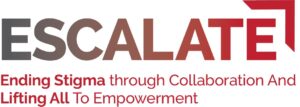 Ending the HIV epidemic in America starts with addressing HIV stigma in the HIV workplace. NMAC believes the best way to create real change is by building partnerships between people living with HIV (PLHIV) and their Ryan White HIV/AIDS Program (RWHAP) service providers. Thanks to funding from HRSA-HAB, NMAC put together this new stigma reduction program with three different learning modalities: 1) trainings, 2) technical assistance, and 3) learning collaboratives in a program called ESCALATE (Ending Stigma through Collaboration and Lifting all to Empowerment). Click here to find out how to register. Participants can only register if they are part of a team that includes a PLWH and their RWHAP service provider.
Ending the HIV epidemic in America starts with addressing HIV stigma in the HIV workplace. NMAC believes the best way to create real change is by building partnerships between people living with HIV (PLHIV) and their Ryan White HIV/AIDS Program (RWHAP) service providers. Thanks to funding from HRSA-HAB, NMAC put together this new stigma reduction program with three different learning modalities: 1) trainings, 2) technical assistance, and 3) learning collaboratives in a program called ESCALATE (Ending Stigma through Collaboration and Lifting all to Empowerment). Click here to find out how to register. Participants can only register if they are part of a team that includes a PLWH and their RWHAP service provider.
NMAC believes the best way to reduce structural HIV stigma is through honest dialogues that are followed with updated policies and procedures that focus on HIV stigma reduction in the workplace. We are looking for real solutions that are client centered. NMAC wants to provide a neutral safe space to have these difficult discussions.
This work will not be easy. HIV stigma sits at the intersection of race, gender, gender identity, and sexual orientation. Because it’s NMAC, we’re going to prioritize race and its impact on HIV services. Yes, we are going there. The solutions are not cookie cutter. We understand the need to tailor policies and procedures. Our efforts will address HIV stigma in the RWHAP workplace. It will not reduce HIV stigma in the larger world.
Trainings are the entry level learning modality. They are for RWHAP funded agencies and PLHIV that are starting to work on stigma reduction. The trainings will bring together teams (providers and clients) to provide an overview of HIV stigma. By the end of the training, teams will develop their first steps to reduce stigma in the workplace. Technical Assistance (TA) is for RWHAP providers who are looking for one-on-one assistance. TA will be specific to the agency seeking assistance and will look at the implementation of tailor-made stigma reducing activities. Learning Collaboratives (LC) are for the advanced RWHAP provider teams (to include PLHIV) who want to be a part of an ongoing group that will implement tests of change using an improvement framework and share their experiences with the other teams. LCs will focus on cultural humility and its role in HIV stigma reduction. We provide different modalities because organizations are in different places among the HIV stigma spectrum, and we want to meet you where you are at.
This HIV stigma reduction initiative is centered on NMAC’s work to end the HIV epidemic in America. There are too many PLWH who have fallen out of HIV care. We believe that providers need to address HIV stigma in partnership with PLHIV. The TA will be provided by Abt Associates, and the LCs will be coordinated by NORC. NMAC will be the lead for the trainings. These learning modalities will start this summer virtually with in-person work slated for 2022. Our stigma reduction efforts are part of a four-year cooperative agreement with HRSA-HAB using the Minority HIV/AIDS Fund. For more information, please email ESCALATE@nmac.org.
Yours in the struggle,
Paul Kawata
NMAC
ESCALATE is supported by the Health Resources and Services Administration (HRSA) of the U.S. Department of Health and Human Services (HHS) and the Minority AIDS Initiative as part of a financial assistance award totaling $1,600,906.100 percentage funded by HRSA/HHS. The contents are those of the author(s) and do not necessarily represent the official views of, nor an endorsement, by HRSA/HHS, or the U.S. Government.
